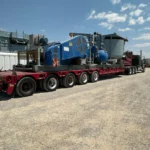Houston is a global logistics powerhouse, driven by its energy, manufacturing, and construction industries. With oversized machinery, drilling rigs, and heavy equipment moving through the city daily, shippers often face complex challenges. That’s where freight brokerage firms come in.
Choosing the right brokerage partner can mean the difference between a smooth delivery and costly delays. This guide explores how to identify top-rated freight brokerage firms in Houston, why they’re essential for heavy haul shipments, and how to choose the right partner for your business.
For a deeper look into the Houston freight industry, see our Ultimate Guide to Freight Brokerage Services in Houston (pillar content).
What Are Freight Brokerage Firms?
At their core, freight brokerage firms serve as the vital link between shippers and carriers. Instead of owning trucks or equipment, they use their expertise, technology, and relationships to match shippers with the right carriers. For shippers in Houston handling large-scale or oversize cargo, a broker simplifies the process by handling the complexities of permits, compliance, negotiations, and tracking.
Curious about the role brokers play? Read our related post: What Does a Freight Broker Do in Houston Logistics Operations?.
Why Heavy Haul Shipments Require Specialized Brokerage Firms
Moving a standard palletized shipment is one thing; transporting a 50-ton excavator across Texas highways is another. Heavy haul shipments often exceed state size and weight limits, requiring special trailers, route planning, and sometimes even law enforcement escorts. Top freight brokerage firms in Houston bring specialized knowledge to ensure these oversized moves happen safely and legally.
When moving drilling rigs or construction equipment, consider working with a firm experienced in Heavy Hauling.
Top Services Freight Brokerage Firms Provide
Not all freight is created equal, and the best brokers understand that. To meet diverse shipping needs, top-rated brokerage firms in Houston provide specialized services tailored to different industries and cargo types. Below are some of the most valuable services for shippers:
1. Oversize and Overweight Load Management
Oversized freight can’t simply be loaded onto a truck and driven away. It requires route permits, escorts, and compliance with state and federal laws. A broker streamlines the Oversize & Overweight process so shippers don’t have to worry about missing paperwork or unexpected road restrictions.
2. Heavy Equipment Transport
Construction and oilfield companies rely heavily on equipment such as bulldozers, cranes, and drilling rigs. Brokers provide safe, insured, and reliable Heavy Equipment Transport by connecting shippers with carriers who specialize in handling this machinery.
3. Trailer and Modular Transport
Transporting modular units or oversized trailers requires planning and coordination. By arranging Trailer Transport, brokers make sure the right equipment and carriers are available to meet tight project deadlines.
4. Specialized Machinery Transport
Sensitive machinery such as CNC machines and industrial equipment require precise handling. Brokers with expertise in specialized machinery moves protect equipment value while minimizing downtime. For example, see our cluster post on CNC Machine Moving: The Smart Way to Transport Precision Equipment.
5. General Freight Shipping Solutions
Beyond heavy hauls, shippers also move regular palletized freight. Brokerage firms use their carrier networks to arrange cost-effective Freight Shipping for day-to-day business needs.

Freight Brokerage Firms vs. Freight Forwarders
Many shippers confuse brokers with forwarders, but the distinction is crucial. Freight brokerage firms act as intermediaries, focusing on connecting shippers with vetted carriers. They don’t physically handle or store goods. Freight forwarders, however, often consolidate shipments, arrange warehousing, and sometimes handle international customs processes.
Understanding the difference helps shippers choose the right partner. For a full breakdown, see Freight Brokerage vs Freight Forwarding in Houston.
Benefits of Working With a Top Freight Brokerage Firm
Partnering with a freight broker isn’t just about finding a truck—it’s about gaining efficiency, reducing costs, and lowering risks. The benefits extend across every stage of the shipping process, especially for companies in Houston dealing with heavy haul loads.
Cost Savings: Brokers negotiate volume discounts and find the most efficient carriers.
Efficiency: They eliminate downtime by quickly matching loads to carriers.
Risk Reduction: With safety checks and compliance oversight, shippers reduce liability.
Flexibility: Brokers provide options for flatbeds, step-decks, reefers, and more.
For additional insight, see our article on Top Benefits of Choosing a Local Freight Broker.
How to Identify Top Rated Freight Brokerage Firms in Houston
Not all brokers are created equal. Shippers must evaluate potential partners carefully before entrusting them with high-value or oversized cargo. The following factors separate top-rated freight brokerage firms from the rest:
Licensing & Compliance – Confirm FMCSA registration and a valid surety bond.
Industry Experience – Choose brokers with proven heavy-haul expertise.
Carrier Network Strength – A large, diverse network ensures consistent capacity.
Technology Integration – Look for brokers using digital load boards and tracking tools.
Customer Reviews & Case Studies – Reputation is a strong indicator of reliability.
For a deeper dive, check out Hire a Freight Broker in Houston: What Shippers Need to Know.
Building Long-Term Partnerships With Brokerage Firms
Instead of treating a broker as a one-time solution, many successful shippers develop long-term partnerships. Doing so comes with advantages like locked-in pricing, first access to carriers during peak seasons, and stronger communication. Over time, brokers learn a shipper’s specific needs, making every shipment smoother and more cost-effective.
Discover more strategies in our related cluster post: Freight Brokers in Houston: How to Choose the Right Partner.
Conclusion
Heavy haul shipments in Houston demand precision, compliance, and trusted partnerships. The right freight brokerage firm can save time, reduce risks, and secure cost-effective transport for even the most challenging loads.
👉 Ready to simplify your logistics? Contact Freight Guru today and partner with a Houston-based expert in freight brokerage and heavy hauling.
FAQs About Freight Brokerage Firms in Houston
Freight brokerage firms act as intermediaries between shippers and carriers, ensuring that goods are matched with the right trucks and transport solutions. They handle everything from rate negotiations to compliance paperwork, making the shipping process faster and more efficient. For shippers, this means saving time, reducing risks, and gaining access to a wide carrier network.
Heavy haul shipments require specialized equipment, route planning, and permits that not all carriers can provide. A freight brokerage firm ensures you’re paired with experienced carriers who know how to move oversized loads safely and legally. This reduces delays, prevents compliance issues, and helps protect your valuable cargo.
Start by verifying that the firm is licensed with the FMCSA and holds a valid surety bond. Look for experience in handling shipments similar to yours, especially heavy haul or specialized equipment. Checking reviews, case studies, and technology capabilities will also give you insight into the broker’s reliability and efficiency.
A freight broker connects shippers with carriers but doesn’t handle or consolidate goods directly. A freight forwarder, on the other hand, often manages storage, consolidation, and even customs for international shipments. Knowing the difference helps you choose the right partner for your domestic or global shipping needs.
Yes, freight brokerage services are often very cost-effective for small and mid-sized businesses. Brokers have access to discounted rates through their carrier network, which can significantly lower transportation costs. They also save businesses time and resources by managing the logistics process end-to-end.





